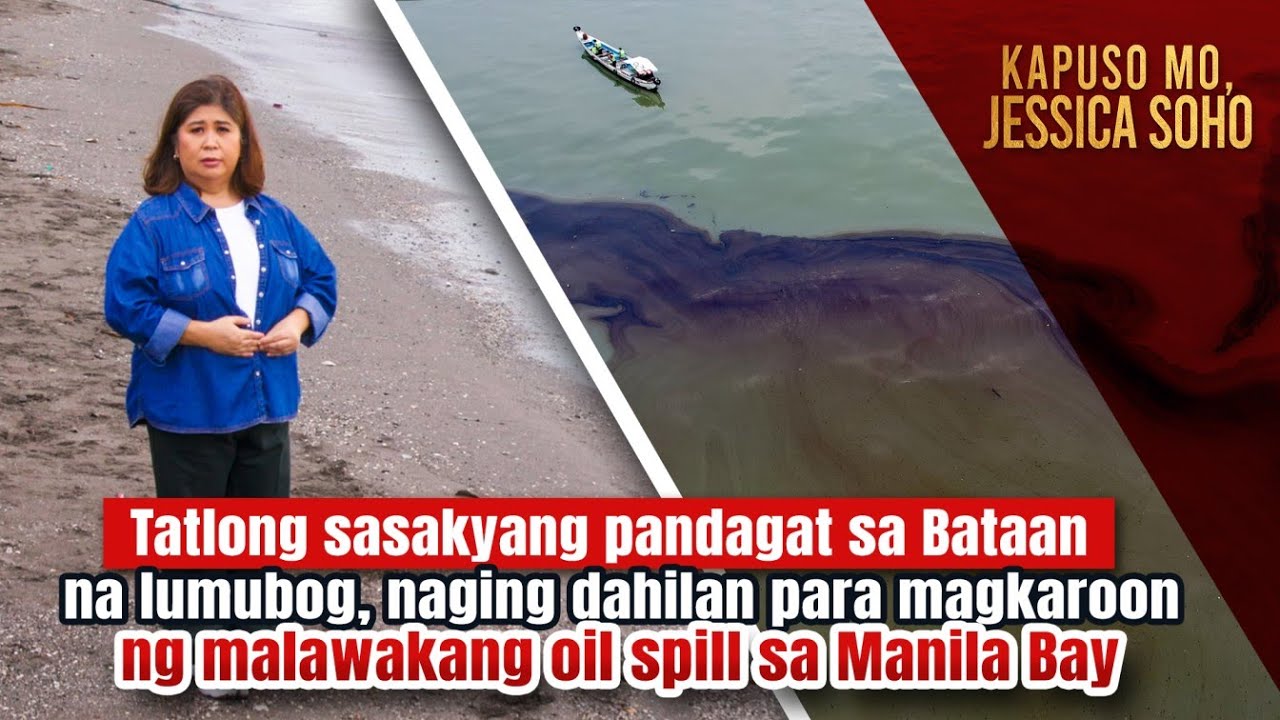How a capsized tanker has caused a devastating oil spill in the Philippines | DW News
Summary
TLDRTyphoon CI has caused a devastating oil spill in Manila Bay after a tanker carrying 1.5 million liters of fuel sank. The Philippine Coast Guard is working to contain the spill with floating barriers. The storm has also left a trail of destruction across Taiwan and the Philippines, causing severe flooding and multiple deaths. Experts discuss the environmental impact and the challenges of cleaning up the sticky bunker fuel oil, while Greenpeace calls for oil companies to be held accountable for the disaster.
Takeaways
- 🌀 Typhoon CI has caused significant damage across Taiwan and the Philippines, leading to strong winds and heavy rains.
- 🚢 A Philippine tanker carrying 1.5 million liters of fuel sank in Manila Bay due to huge waves, resulting in an extensive oil spill.
- 🛑 The Philippine Coast Guard has initiated emergency measures to contain the oil spill using floating barriers to prevent further leakage.
- 🔍 All but one crew member were rescued in a high-risk nighttime operation, highlighting the urgency and danger of the situation.
- 🌊 The oil spill poses a potential environmental disaster near Manila, with the slick stretching for several kilometers.
- 📉 Five freighters were stranded off Taiwan, with one sinking and ongoing search efforts for its crew.
- 🏠 Torrential rains have caused severe flooding in the Philippines, with residents in the southern city of Kung scrambling to save their belongings.
- 🌊 The typhoon is also impacting mainland China's Eastern Fujian province, with the National Marine forecaster issuing its first Red Alert of the year.
- 📚 Professor Michelle Boufadel from the New Jersey Institute of Technology discusses the challenges of managing the oil spill, especially given the thick and sticky nature of bunker fuel oil.
- 🌱 Greenpeace's Manfred Zanton emphasizes the potential long-term environmental impact, including effects on birds, people, and the fishing industry, and calls for oil companies to be held accountable.
Q & A
What is the main issue discussed in the script?
-The main issue discussed is an oil spill caused by a sunken tanker in Manila Bay following Typhoon CI, which is threatening the environment and the capital city of the Philippines.
What was the tanker carrying when it sank?
-The tanker was carrying nearly 1.5 million liters of fuel when it sank after encountering huge waves in Manila Bay.
What measures are being taken to contain the oil spill?
-The Philippine Coast Guard has launched an operation using floating barriers to contain the spill and prevent further leakage, aiming to avert a major environmental disaster.
How many crew members were rescued from the sunken tanker?
-All but one of the crew members were rescued in a risky nighttime operation.
What is the nature of the oil that was being carried by the tanker?
-The tanker was carrying a thick oil known as bunker fuel oil, which is sticky and can adhere to surfaces.
What are the potential environmental impacts of the oil spill in Manila Bay?
-The oil spill could impact the local environment, including underwater ecosystems, birds, and the livelihoods of fishermen. It might also mix with sediments and sink to the bottom, posing risks to water intakes for energy plants.
How does the storm's severity affect the oil spill's dispersion?
-The storm's churning waters could dilute the oil in the bay, but it might also mix with sediments and sink, posing long-term risks that could be reactivated by future storms.
What is the significance of the oil spill for the local community and environment?
-The oil spill poses a significant threat to the local community, affecting fishermen's businesses and potentially leading to long-term environmental damage, including the destruction of ecosystems and harm to wildlife.
What is the role of oil companies in such disasters according to Greenpeace?
-Greenpeace calls for oil companies to be held responsible and accountable for the consequences of oil spills, including helping with cleanup efforts and compensating for losses and damages.
What is the scale of this oil spill in the context of Philippine history?
-According to Greenpeace, this could be one of the biggest oil spills in the Philippines in many years.
What is the current status of the typhoon after the events in the Philippines?
-After causing destruction in the Philippines, Typhoon CI has moved on to mainland China, where it is battering the eastern Fujian province with strong winds and heavy rain.
Outlines

هذا القسم متوفر فقط للمشتركين. يرجى الترقية للوصول إلى هذه الميزة.
قم بالترقية الآنMindmap

هذا القسم متوفر فقط للمشتركين. يرجى الترقية للوصول إلى هذه الميزة.
قم بالترقية الآنKeywords

هذا القسم متوفر فقط للمشتركين. يرجى الترقية للوصول إلى هذه الميزة.
قم بالترقية الآنHighlights

هذا القسم متوفر فقط للمشتركين. يرجى الترقية للوصول إلى هذه الميزة.
قم بالترقية الآنTranscripts

هذا القسم متوفر فقط للمشتركين. يرجى الترقية للوصول إلى هذه الميزة.
قم بالترقية الآنتصفح المزيد من مقاطع الفيديو ذات الصلة

Philippines oil spill: Tanker carrying 1.4 million litres of oil capsizes

Oil Spill Modelling in the Balikpapan Bay Case Study : Incident of 31 March 2018

Pior desastre ambiental no Alasca (1989)

Philippines oil spill sparks fears of environmental catastrophe | DW News

Tatlong sasakyang pandagat, dahilan ng malawakang oil spill sa Manila Bay | Kapuso Mo, Jessica Soho

Powerful storm kills at least 12 in the Philippines
5.0 / 5 (0 votes)
